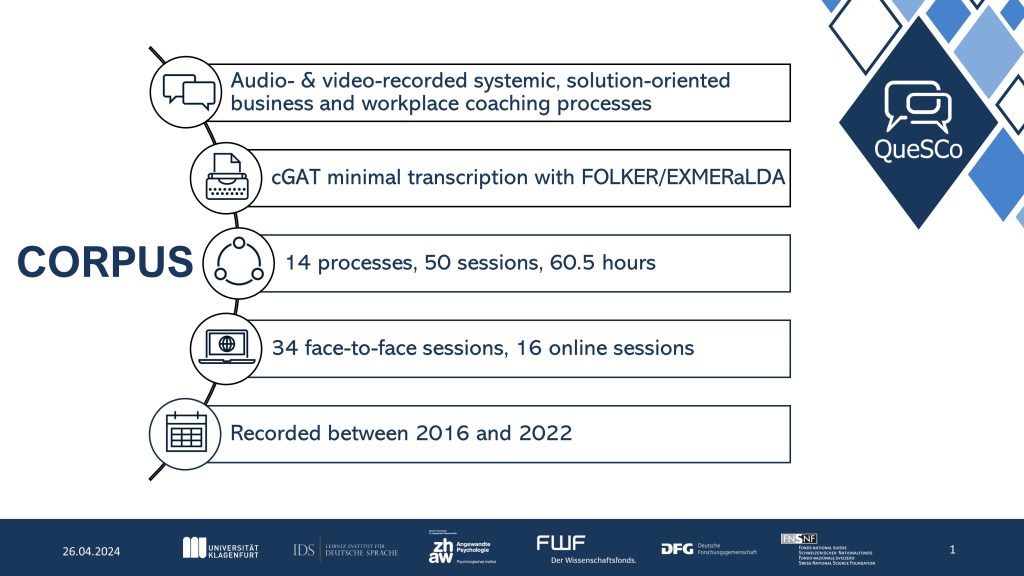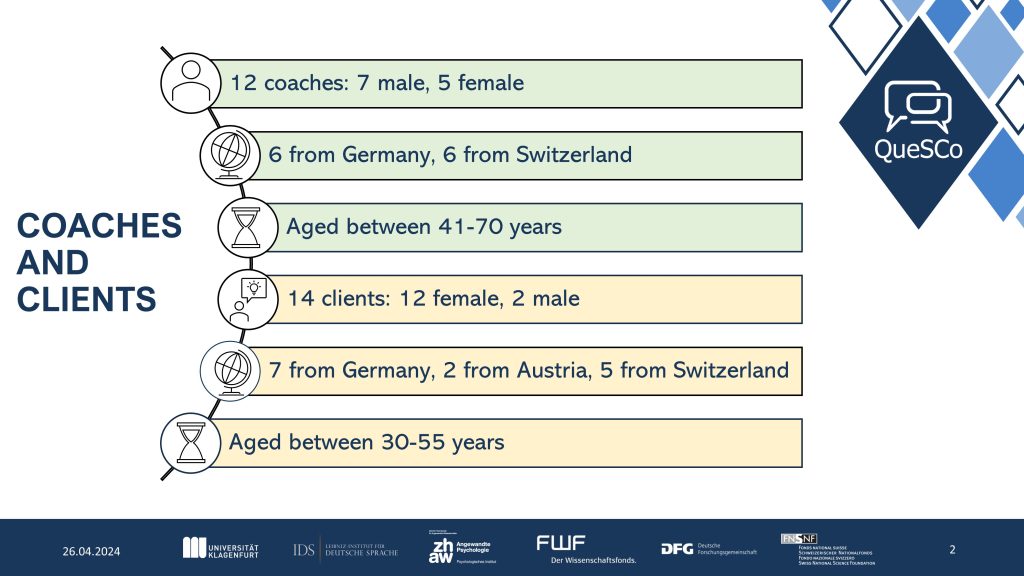Results
Corpus
The coded QueSCo corpus consists of 14 processes with overall 50 sessions (between 36 and 100 minutes) of audio-/video-recorded systemic, solution-oriented business and workplace coaching interactions. The entire corpus amounts to 60.5 hours. It includes 34 face-to-face sessions and 16 online sessions, recorded between 2016 and 2022. The sessions were transcribed using cGAT minimal transcription conventions in FOLKER / EXMERaLDA.
Participants: Overall, 12 coaches (7 male, 5 female) aged between 41 and 71 years from Germany and Switzerland form part of the coded corpus. They had a mean of 18.4 years of experience and mostly adhered to systemic coaching approaches with specifications including, e.g., systemic resource-oriented or hypno-systemic coaching. Their 14 clients (12 female, 2 male) were aged between 30 and 55 years and were originally from Germany, Austria and Switzerland.
The entire data collected during the QueSCo project amounts to 24 processes with overall 116 sessions of systemic, solution-oriented coaching interactions recorded between 2016 and 2024. 22 processes (104 sessions) are in German, 2 (14 sessions) are in English. The collected data amounts to 149 hours in total. 57 sessions were carried out face to face, 59 took place online. Of the entire data, 90.5 hours (66 sessions) have already been transcribed.
Participants: Overall, 14 coaches (7 male, 7 female) from Germany, Switzerland and the UK participated in the project. 24 clients (17 female and 7 male) took part in the coaching sessions collected for QueSCo. There were form Germany, Switzerland, Austria, and the UK. With first languages including German, Spanish/Catalan, and Dutch. The clients were aged between 30 and 60 years.


Manuals
The first version of our German manual was published on June 9, 2023. However, the teams from Klagenfurt, Mannheim, and Zurich continued to work on and refine the coding manual and added new examples to the third position in psychology. The third version (V3) was published on April 22, 2024.
The first version of our (translated) English coding manual was published on March 13, 2024.
Our coding manual is an open access publication and can be accessed via the University of Klagenfurt’s netlibrary / repository.
A manual for the coding of phases in coaching (MaPCo) was published in October 2024.
Posters
To mark the occasion of the 50th anniversary of the University of Klagenfurt’s Department of English, we designed and exhibited two research posters that a) presented the QueSCo project (poster 1) and b) embedded it in the developments and research landscape of linguistic coaching process research (poster 2). Poster 3 represents an updated version of poster 1, and illustrates some of the most important project results. In the course of an evaluation of the Pragmatics Department at the Leibniz Insitute for the German Language, another poster featuring the QueSco project was created (poster 4) (only German version available).
Published Project Results
Dionne, Frédérick, Fleischhacker, Melanie, Muntigl, Peter & Graf, Eva-Maria (2024). Resisting wh-questions in business coaching. Frontiers in Psychology. Topical collection: Innovative studies in organized helping: Transforming relations, emotions and referents through sequentially structured practices.
DOI: 10.3389/fpsyg.2024.1240842
Fleischhacker, Melanie & Graf, Eva-Maria (2023). New ways of investigating coaching: linguistic research on executive, business and workplace coaching – a systematic scoping review. Coaching: An International Journal of Theory, Research and Practice.
Fleischhacker, Melanie & Graf, Eva-Maria (2024). A closer look into the ‘black box’ of coaching – linguistic research into the local effectiveness of coaching with the help of conversation analysis. Coaching: An International Journal of Theory, Research and Practice.
Graf, Eva-Maria, Dionne, Frédérick, & Fleischhacker, Melanie (2023). The Transformational Power of Questioning Practices in Coaching. Insights from Linguistics and Interdisciplinary Research. In: M. Degani, & W. Delanoy (eds.) Power in Language, Culture, Literature and Education, 119-149. Narr.
ISBN: 978-3-8233-8604-9
Graf, Eva-Maria, Künzli, Hansjörg, & Spranz-Fogasy, Thomas. (2024). Fragepraktiken im Coaching. Erkenntnisse aus einem interdisziplinären Forschungsprojekt.
Coaching Magazin, 1(2024), 49-53.
Website: Coaching Journal
Jautz, Sabine, Graf, Eva-Maria, Fleischhacker, Melanie & Dionne, Frédérick. Agenda-setting in first sessions of business coaching. A focus on coaches’ practices to manage the agenda and establish the working alliance. Frontiers in Psychology.
Moos, Chantal, Fleischhacker, Melanie, Dionne, Frédérick, Spranz-Fogasy, Thomas & Graf, Eva-Maria (2023). Fragen als Motor für Veränderung? Ein interdisziplinäres Forschungsprojekt zu Fragepraktiken im Business Coaching. Sprachreport, 39(2), 28-35.
Moos, Chantal, & Spranz-Fogasy, Thomas (2024). “now once again this idea of yours (…) how does it sound when I say that?” – Changing the perspective: How coach’s questioning practices elicit self-reflecting processes in clients. Frontiers in Psychology.
Calasso, Lara F., Burtscher, Michael J., & Künzli, Hansjörg (2024). What are executive coaches actually doing and when are they doing it? A systematic review of coaching behavior.
Consulting Psychology Journal.
DOI: 10.1037/cpb0000267
Fleischhacker, Melanie, Graf, Eva-Maria & Kabatnik, Susanne (2024). Fragentypen zur Lösungsentwicklung im Business Coaching. Zeitschrift für Angewandte Linguistik, 81, 283-332.
Graf, Eva-Maria, Fleischhacker, Melanie & Dionne Frédérick (2025). How coaches and clients do questioning. Coaching: An International Journal of Theory, Research and Practice, 1-25.
Graf, Eva-Maria, Dionne, Frédérick, Fleischhacker, Melanie, Künzli, Hansjörg & Spranz-Fogasy, Thomas (2025). Expansion, reduction or both? Nota bene, 2(1), 60-105.
DOI: 10.1075/nb.00024.gra
Calasso, Lara, Künzli, Hansjörg & Burtscher, Michael (2025). Coaching in action. Coaching: An International Journal of Theory, Research and Practice, 18(2), 168-186.